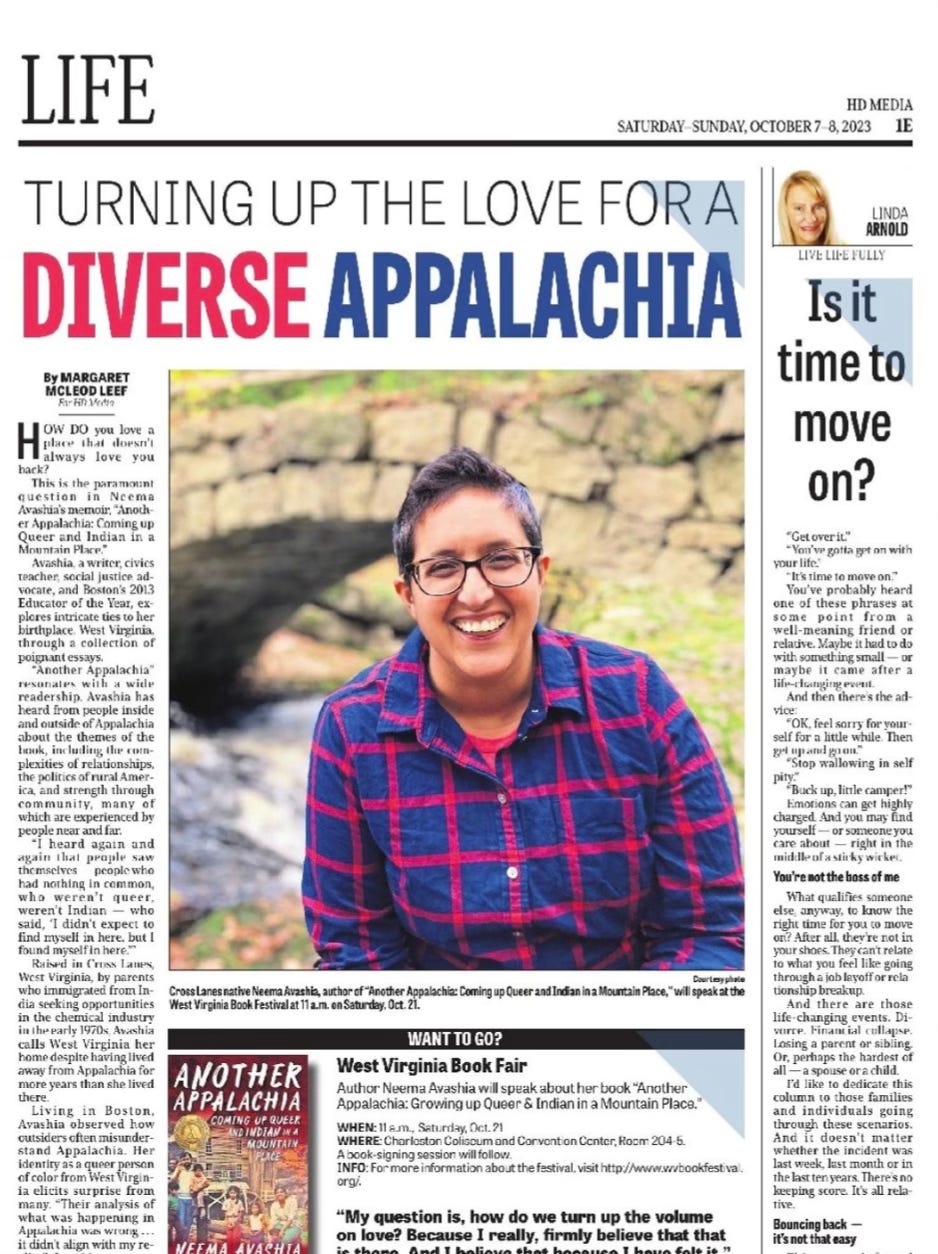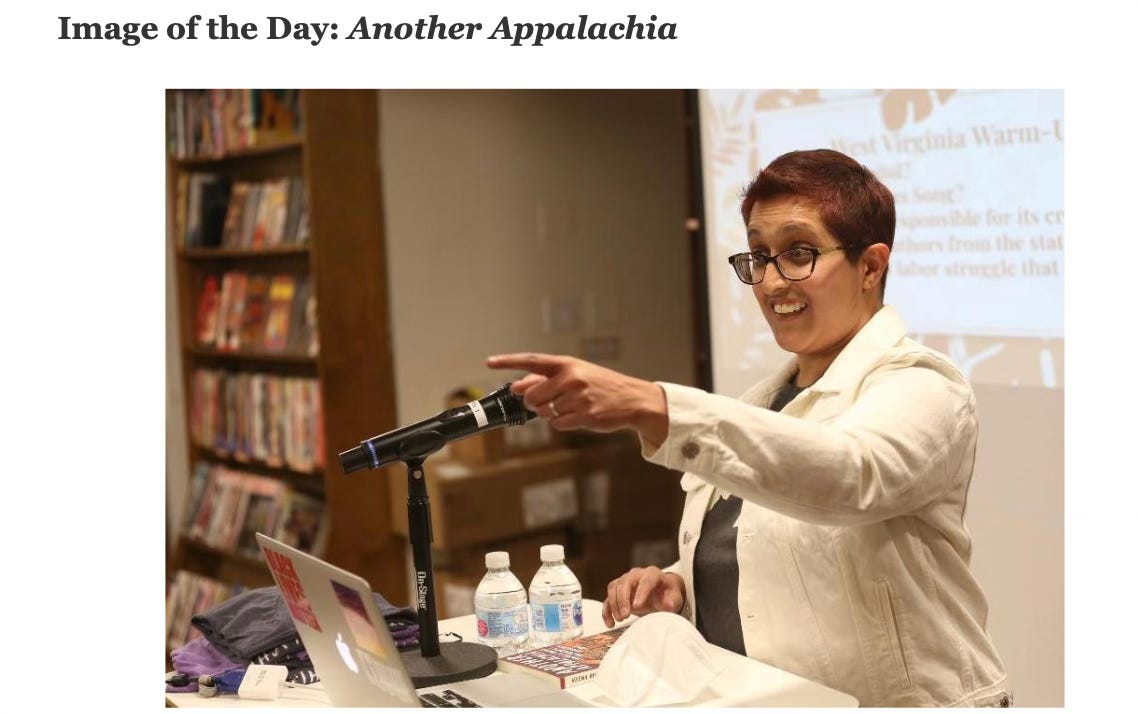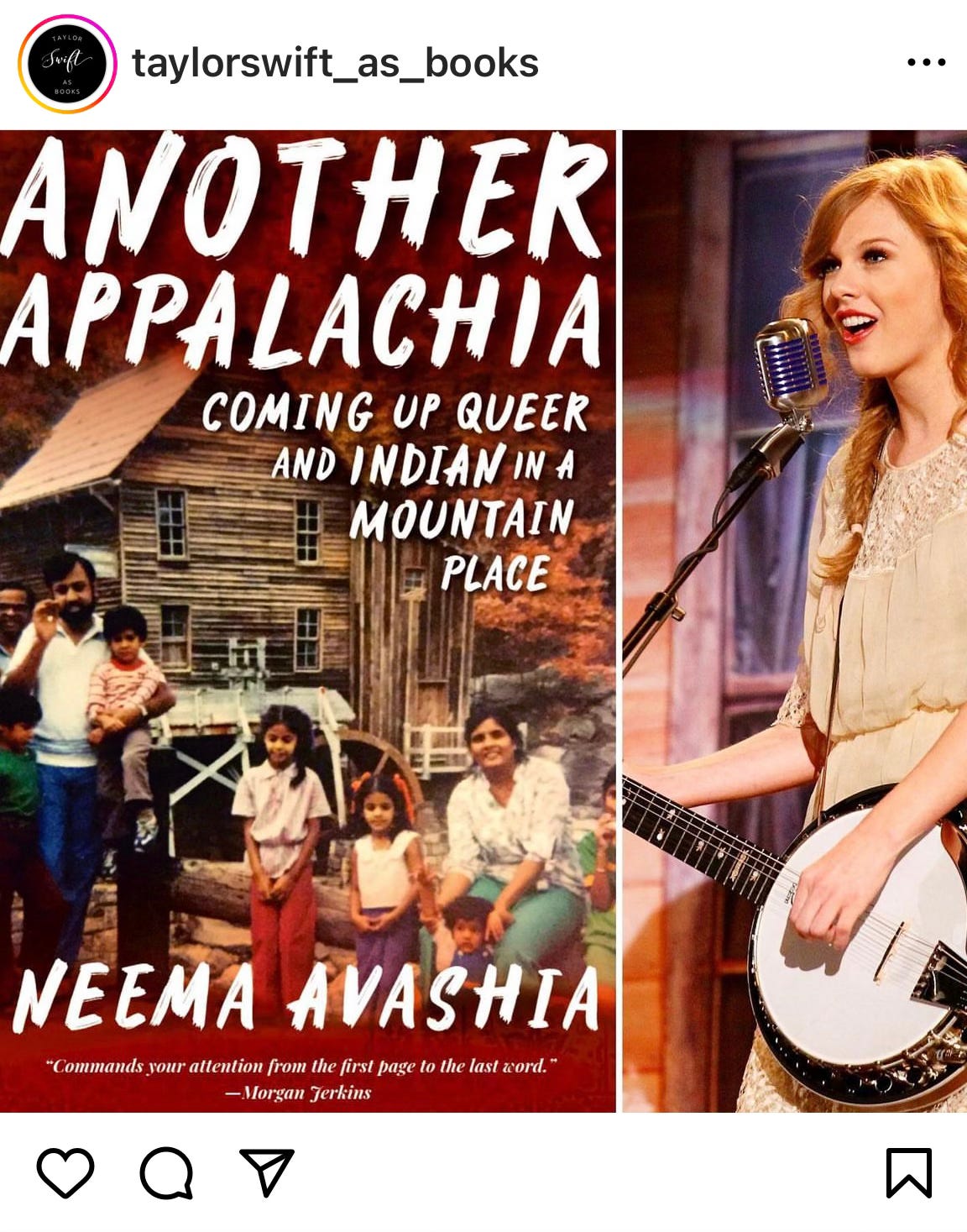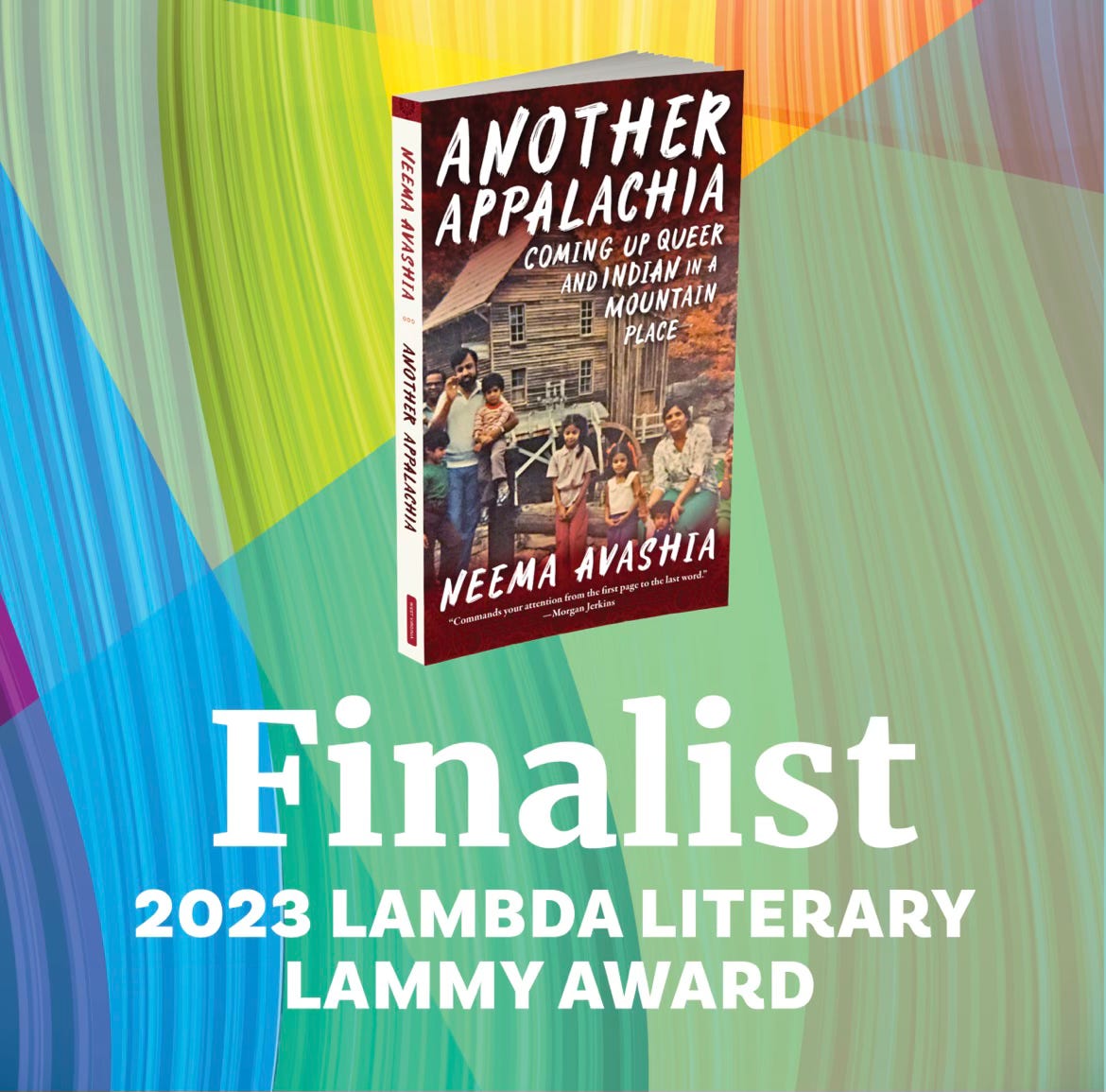Book marketing as collaboration
An interview with author Neema Avashia
There’s no single, correct way to drum up excitement about a book, and I think conversations about publishing (especially, perhaps, with small houses) would benefit from a wider range of candid stories about how books found their audiences. My Q&A below is designed to share some of that insider perspective.
I’m joined by author and teacher Neema Avashia. Working with Neema on Another Appalachia: Coming Up Queer and Indian in a Mountain Place—alongside publicist Jeremy Wang-Iverson of Vesto PR, with whom I’m now an occasional collaborator in my capacity as an independent consultant—was a highlight at my previous job. I’m so pleased that Neema was willing to chat with me about the experience of building a community around her book.
Your book followed an unusual trajectory, I think, never picking up the pre-pubs like PW or Kirkus or landing a big Times or the like. But the attention from small to midsize outlets has been steady over a long span, often animated by what feels like intense affection for the book. Does that align with your sense? What do you see as the advantages of this less conventional arc?
I think because of some combination of ignorance about things like PW and Kirkus, and profoundly limited expectations about what was possible for my book (who the heck was going to want to read a book about growing up queer and Desi in West Virginia?), I’ve only ever been grateful for whatever attention Another Appalachia has received. Whether it was a DM from a queer Appalachian reader, or a beautiful review at 100 Days in Appalachia, or an interview at Salon that had both me and interviewer Alison Stine in tears, or a companion piece to W. Kamau Bell’s “United Shades of America” episode about Affrilachia on CNN, it’s all just felt like a series of gifts, one after the other, that have just continued to come even 2+ years post publication.
I’ve seen some authors express frustration about the things that didn’t happen for their book—the reviews they didn’t get, or the sales they didn’t make. And while I totally get where this comes from, it also feels like such a recipe for perpetual disappointment. As an author, you lose a great deal of control of your book once it is published. You put in all this love and care and work to get to publication, but have very, very little control over how it will be received in the context of a market that is, at best, fickle, and at worst downright steeped in discrimination.
I think that keeping my expectations in check, and just feeling deep joy for whatever good comes my way, has allowed me to continue to support my book, and engage with readers, and embrace opportunities without feeling burnout or resentment. I also think there’s some real benefit in being an underdog in the fight. No, I didn’t get a big review in the Times, or added to Oprah’s booklist, or any of that flash-in-the-pan marketing blitz that the Big 5 specialize in. I’ve known from the jump that I needed to be my book’s biggest champion, and knowing that has helped me to fight for it, and its readers, in all the ways that they both deserve.
I remember the nice Alison Stine piece in Salon hitting, I think, just as you were arriving in Pittsburgh for a series of events that turned out very well. (The book ended up being one of the year’s bestsellers at White Whale, where you read to a capacity crowd during your visit, and also at Riverstone Books, another stop here in Pittsburgh.) For me, the confluence of the Salon piece and the events felt like things falling in place—like the book had achieved a sort of velocity. Was there any one moment that felt like that for you? At a certain point did you think “Okay, this is a success”?
Success in the publishing world feels like such an amorphous thing to me. Is it the number of books you sell? The publicity you get? The awards you receive? The strange thing about Another Appalachia is that it’s done well on so many of those metrics without anyone besides you, Derek, believing that it was a book that could sell. (I can’t tell you how many “This is beautiful, but we can’t sell it” messages I got when querying agents.) In that regard, I think that being named a best book of 2022 by the New York Public Library, and being a finalist for a Lammy, both definitely felt like moments when I hit external metrics of success—ones set by the industry, rather than by me. (Also, when the audiobook of Another Appalachia outsold Prince Harry’s Spare last year—that was pretty amazing! :) )
But if I’m being honest, success for me operates on a different scale. I was back home in Appalachia this past week, and twice at readings, young people stood up and said thank you to me for writing a book that they could see themselves in. That before my book, they’d never experienced reading a book where they saw themselves, their questions and their identity, reflected. I talked to a bookseller at my hometown bookstore who told me through tears that my book is changing the lives of young West Virginians, including her own child. I was given the founders award by the ACLU of West Virginia for the impact Another Appalachia has had on LGBTQ youth in the state. Those aren’t the kind of metrics you’d ever see a publisher talk about in terms of success, I don’t think, but they are the metrics that matter most for me.
I want to ask about social media, and also about the email list you put together. What effect do you think the former has had? What about the latter, which I love—in part because your updates to the email list make a narrative about the book and about you. Was that a big investment? Did it seem worth it?
I worry sometimes that the push for authors to “build a platform” on social media kind of misses the point. I don’t think you sell books by building a one-dimensional platform whose purpose is to sell books. I think that community and relationships sell books, and I think that social media can be a vehicle by which community and relationships get built. (I know you’re going to say, “But Booktok!” And what I’ll say is that for the number of authors being pushed to make awkward TikToks as marketing, I don’t think the sales ratio really bears out. Seeking virality is not a good marketing strategy. Come at me.)
As an Expatalachian, social media was the place where I was finding my people well before the book came into existence. Those folks certainly weren’t living in Boston, where I’d settled, and post-2016 I needed to be engaging in a conversation with folks who were grappling with the same questions about home that I was. And that community of people ultimately became some of the biggest champions of the book. Social media allowed me to find a group of people who shared my questions. So when I wrote a book FULL of those questions, there were certainly folks in that community who I think were inclined to read it. Going back to Alison as an example, she wrote a beautiful Salon piece about Joe Burrow’s Appalachian roots and how they show up on the football field long before she interviewed me.
As for the email list—it was a pretty easy thing to set up. I put out a call to folks in my in-person and online communities to ask if they would be interested in getting infrequent updates about the book, then used the newsletter function in Squarespace (which is how I created my website) to send out updates over the first year of the book’s life. I definitely think a lot of pre-orders, and a lot of the early Goodreads reviews, came from those initial supporters of my work.
I think when smaller presses invite authors to collaborate on marketing, it sometimes sounds like "author, you do the work instead of us." How does this dynamic look from your perspective?
I think whether you publish with a small press or a big house, the reality is that marketing is always part of an author’s work. My book, at the end of the day, is mine. I have to be its biggest champion. And I’m, in many ways, the only person who can be its biggest champion, because I understand its nature, and audience, better than most other people. (Again, I think I got deeply lucky in publishing with WVU Press, because this was a place where we had a lot of shared knowledge. I’m not sure folks are always so lucky.)
I got so much joy out of our collaboration, because there was really room to experiment and create: getting to work with Just Seeds to design book plates from the pre-order campaign, coming up with chaat masala label designs with the press’s art director, brainstorming media outlets to pitch. . . . It really felt like we were doing so much of that together, but also like I could come to you with some fairly untraditional ideas, and they were really welcomed. This isn’t a thing I always hear from authors at Big 5 houses—it seems like unless you’re their big book for the season, you get a standard marketing package that consists of a predetermined set of actions, and that’s it. I loved that in publishing with a small press, there was so much opportunity to bring my identity and creativity into the marketing process.
That’s definitely how I saw it. Because we were a mission-driven publisher, and there was such alignment between our mission and your vision for the book, it didn’t feel like promotion as much as mutual support. Amplifying each other’s messages, crafting visuals to celebrate successes—I’m sure these helped with sales (around 8K units so far, I hear, if I’m allowed to share that). But it also felt like a natural way to work together toward a social good. So some of that collaboration is specific to you, your subject matter, and the nature of the house where you published. What if anything strikes you, though, as more widely applicable? Do you have tips for authors?
I will probably turn green from saying this again and again, but I truly believe that relationships sell books. That community sells books. So the more that authors can orient towards building meaningful relationships—with the editors and marketing team at their publisher, with librarians, with independent bookstores and the booksellers who work there, with educators, with podcasters and bookstagrammers and readers—the more they’ll feel sustained in the work, and (I think) the more their book will sell.







I've enjoyed watching this ride a lot! Congratulations to both of you.